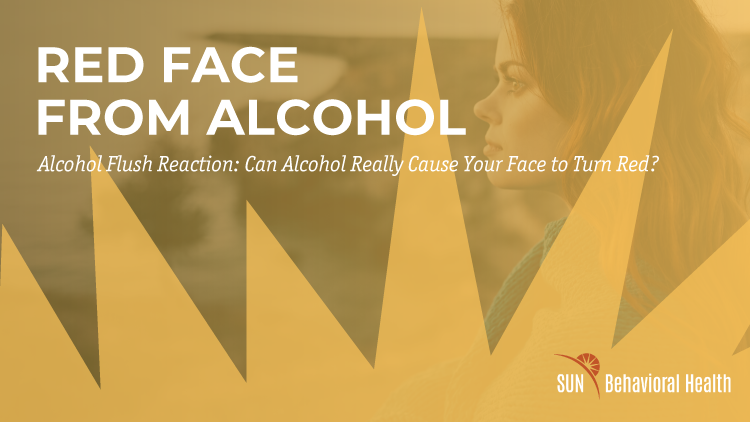Services

You had always viewed your relationship with alcohol as a complicated one. You spent many nights drinking alone or with friends, often ending with a friend wondering why your face was red. You had never cared before, as you didn’t see how a red face could prevent you from enjoying alcohol. However, one day, you went to the doctor following routine blood work, and the doctor asked you about your alcohol use. He believed that having a red face following alcohol use may be a result of a toxin known as acetaldehyde built up in your body. He urged you, if you were unable to stop drinking on your own, to seek treatment.
In 2021, 12.9% of people in Delaware participated in binge drinking. People who binge drink may have a higher chance of experiencing a red face due to how the body metabolizes alcohol. It is important to note that not everyone who binge drinks will experience a red face, but it can be more common because of the build-up of acetaldehyde in the body. Your body can only metabolize one drink in an hour, so this build-up can occur when you drink more than that.
At SUN Behavioral Health Delaware, we offer no-cost care assessments that allow you to meet with a representative who can determine the best care plan for your unique needs and answer your questions. We also use this blog to educate you about various topics or questions. Today, we are going to discuss having a red face from alcohol and what it means.
Often resulting from an alcohol intolerance, some people may experience their face turning red following the consumption of alcohol. This reaction may only be the red face but can also come with additional symptoms such as nausea, hives, migraines, worsening asthma, or low blood pressure. This reaction does not indicate that someone has an alcohol allergy.

This phenomenon is often genetic and comes about due to specific enzymes that impact how people metabolize alcohol. When the body is metabolizing alcohol, it uses alcohol dehydrogenase (ADH) to change alcohol into acetaldehyde, which is a toxic substance. Your body then changes acetaldehyde into a nontoxic substance with an enzyme known as aldehyde dehydrogenase (ALDH). From there, your body can properly metabolize alcohol.
However, if alcohol, and specifically acetaldehyde, is not metabolized correctly, it can result in people experiencing a red face as well as other symptoms. Mutations of the two enzymes above may result in this happening. Those mutations occur in the aldehyde dehydrogenase gene (ALDH2) and the alcohol dehydrogenase gene (ADH1B), which are known to change alcohol metabolizing in the body. People of East Asian ancestry are most likely to have these genetic mutations and experience face flushing from alcohol use. If you are not of East Asian origin, it is also possible to have these mutations, though not as common.
Women who have rosacea may also be more likely to experience a flushed face when they drink alcohol. While drinking alcohol may increase someone’s risk of developing rosacea and increases the chances of a flare-up once developed, not everyone who has rosacea has it because of alcohol use. It can come from various reasons, such as stress or sun exposure. Alcohol consumption is just one potential cause.
It is also possible that those taking certain medications may experience flushing when they are drinking alcohol. The most common medications that might result in a red face when drinking alcohol include medications for high cholesterol, infections, and diabetes. Over-the-counter medications such as acetaminophen may also result in flushing.
When you drink alcohol, you may also get redness in the face due to blood vessels in your face expanding and contracting. Your face is where skin is thinner, which makes a red, flushed face more visible.
Anyone can experience a flushed face due to drinking alcohol since several things can cause it. Still, there are a few ethnicities that are more likely to encounter a flushed face when they partake in alcohol use. The most common ethnicities most likely to experience a red face due to drinking alcohol include those of Chinese, Korean, or Japanese descent. There are also some reports that people who are of Jewish descent might be susceptible to experiencing face redness from alcohol. In these cases, it is genetic and passed on from one or both of your parents.
You also may be more likely to experience this sensation if you are taking certain medications and drinking alcohol. Those medications might be over-the-counter, such as acetaminophen and cold medicines, or prescription medications, such as diazepam.
People with rosacea, a condition in which your face will flush or turn red, may experience flare-ups more often if they drink alcohol. These flare-ups occur because rosacea may result from an overactive immune system. If you are heavy drinking, your immune system can trigger a rosacea flare-up or a red face.
Those who are more likely to experience flushing when drinking alcohol are also at a higher risk of developing cancer. Having the ADH1B or the ALDH2 genes puts people at a higher risk of developing esophageal and breast cancer. However, it doesn’t necessarily mean you will develop cancer, only that you might have increased levels of acetaldehyde in your body when you drink alcohol. This could result in the growth of cancer cells. You might also be at a higher risk of developing blood pressure concerns if you experience facial flushing following the consumption of alcohol.
Ultimately, the best way to prevent a red face from alcohol is not to drink alcohol or, at the very least, limit how much you drink. You cannot change your genes, which makes abstaining from drinking alcohol the best way to avoid having a red face. While some people might take medications, such as antihistamines, to reduce the effect of a red face, this method does not solve the higher levels of acetaldehyde, which continues to put your health at risk.

Stopping one’s alcohol use is not always as simple as just not drinking it. If you have other symptoms alongside your red face when you drink alcohol, such as binge drinking, blackouts, and difficult relationships, you may be developing an alcohol use disorder. Those who have an alcohol use disorder may find stopping alcohol consumption much more challenging. However, this is where alcohol detox can come into play. By seeking treatment for an alcohol use disorder, you can find the inner strength that has always existed within you. Along the way, you will learn skills and techniques to help you down the road of recovery and connections you can lean on when you need them the most.
Located in Georgetown, DE, SUN Behavioral Health Delaware strives to solve unmet needs in our community. We offer crisis care 24/7 because we understand that a crisis does not only come during business hours. For more information, or if you would like to get started on alcohol use disorder treatment, please call us at 302-604-5600 today.
There are reports that alcohol can cause rosacea to flare up. However, alcohol may not be the only cause as to why someone might have worsening rosacea. Women who drink alcohol regularly may be more likely to get rosacea and have worsening symptoms, but rosacea can also worsen with sun exposure, stress, spicy foods, or hormonal changes. It is most likely that alcohol causes your immune system to be overworked, which then results in a rosacea flare-up.